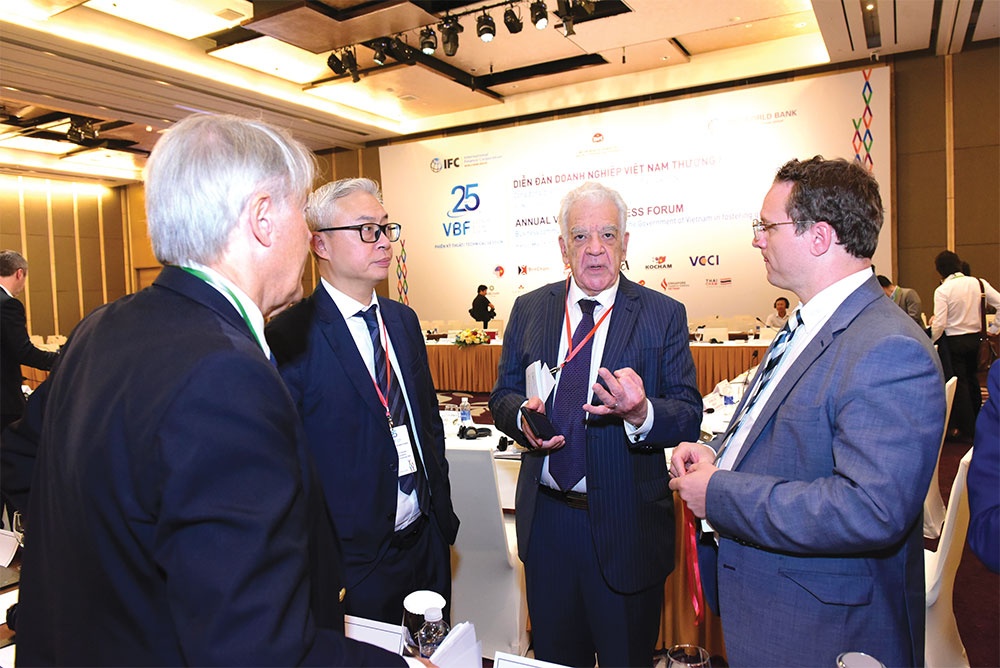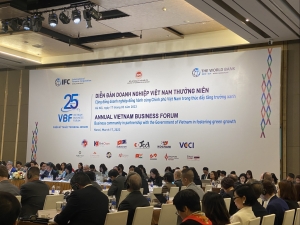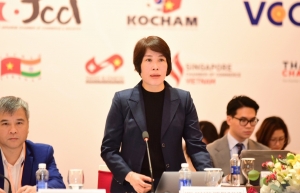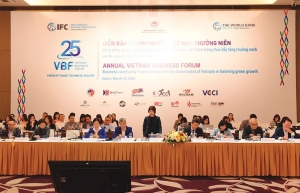Beverage leaders plead for excise tax postponement
 |
| Beverage leaders plead for excise tax postponement, illustration photo/ Dung Minh |
The Vietnam Beer-Alcohol-Beverage Association met in the central city of Danang last week to discuss the Ministry of Finance’s (MoF) proposed tax increase on alcohol and sugary drinks. The association asked for a postponement of the excise tax for at least the next two years, as well as the removal of sugary drinks, barley drinks, and non-alcoholic beverages from consumption tax obligations.
“We acknowledge that there may be a need for additional taxes and fees in the future, but their effects should be carefully evaluated to make sure they help business recovery and do not hinder economic progress. For instance, the government should research how the proposed tax hike could affect both consumers and businesses,” said Nguyen Quoc Viet, deputy director of the Institute for Economic and Policy Research.
Viet explained that the beverage industry has grown in production, but its performance had fluctuated greatly in the past five years.
“An incident like the pandemic damages this industry much more than other industries, like food and tobacco. This proposal is inconsistent with government policies and guidelines on production and business recovery, especially tax reform policy towards 2025,” he added.
“If the tax rate increases now, the total budget revenue is unlikely to increase. Total demand over GDP is decreasing, and raising taxes will cause this proportion to go down.”
Vo Tri Thanh, director of the Institute of Branding and Competition Strategy, said that taxes should not be changed during the current period to give more time to research, assess the social impact, consult businesses, and study international experience regarding the tax.
He suggested that the authorities look at a mixed tax, applying the tax calculation according to an overall percentage and absolute tax, from 2026, when Vietnam should move closer to being an upper middle-income economy.
“Businesses need a stable tax and fee environment to return to pre-pandemic levels, and at the same time make sustainable tax payments to the state,” Thanh said.
Over the past 15 years, duty on the alcohol industry has been adjusted five times. The tax increased from 50 per cent in 2015 to 55 per cent in 2016, and then rose to 65 per cent in 2018. The taxable basis also shifted from the import price to the wholesale price.
Other industry players claimed that any change in tax policy could undermine the Vietnamese government’s efforts to improve the country’s business environment and competitiveness.
“The country’s socioeconomic progress has been significantly influenced by the alcoholic beverage industry,” said Nguyen Van Viet, chairman of the Vietnam Beer-Alcohol-Beverage Association chairman. He highlighted how the industry generates employment and adds an estimated $2.6 billion to the state budget each year, encouraging the growth of other industries. Companies in the industry are also setting the bar for corporate social responsibility and sustainable growth.
Multinational financial news site Business Insider predicted weakened consumer spending will impact the growth of beer sales in 2023. Moreover, some regulations, including the prevention and control of alcohol-related harm and a decree regulating strict fines for drink-driving introduced in 2020, are believed to have reduced alcohol consumption by 20-30 per cent.
 | VBF: Agribusiness working group recommends digital transformation The working group argues that Vietnamese agriculture needs to apply technology and digital transformation to create a turning point in agricultural production, moving from a traditional agrarian economy to one based on scientific technology, digital transformation, and circularity. |
 | VBF: FIEs seek IRC easement for new locations Foreign-invested enterprises (FIEs) require the authorities to loosen regulations to grant investment registration certificates (IRCs) for their business locations and branches. |
 | Fostering ties with private sector in green growth The technical session of the Vietnam Business Forum (VBF) took place on March 17 with a theme of partnership between the private sector and the government to foster green growth. |
 | VBF asks for digitalisation of learning (Education 4.0) To encourage the continued development of Vietnam's economy, the upskilling and education of its future labour force is essential. |
 | Business community leads call to action for authorities Significant focus was placed on revitalising the economy, smoothing out tax issues, and ensuring a green transition at last week’s Vietnam Business Forum. |
 | Employers seek clarity on easing work permit process Foreign employers are pleading for a more straightforward process in obtaining work permits, but authorities have pointed out that ensuring a smooth process is a 2-way street. |
What the stars mean:
★ Poor ★ ★ Promising ★★★ Good ★★★★ Very good ★★★★★ Exceptional
 Tag:
Tag:
Related Contents
Latest News
More News
- Masan Consumer names new deputy CEO to drive foods and beverages growth (February 23, 2026 | 20:52)
- Myriad risks ahead, but ones Vietnam can confront (February 20, 2026 | 15:02)
- Vietnam making the leap into AI and semiconductors (February 20, 2026 | 09:37)
- Funding must be activated for semiconductor success (February 20, 2026 | 09:20)
- Resilience as new benchmark for smarter infrastructure (February 19, 2026 | 20:35)
- A golden time to shine within ASEAN (February 19, 2026 | 20:22)
- Vietnam’s pivotal year for advancing sustainability (February 19, 2026 | 08:44)
- Strengthening the core role of industry and trade (February 19, 2026 | 08:35)
- Future orientations for healthcare improvements (February 19, 2026 | 08:29)
- Infrastructure orientations suitable for a new chapter (February 19, 2026 | 08:15)





















 Mobile Version
Mobile Version